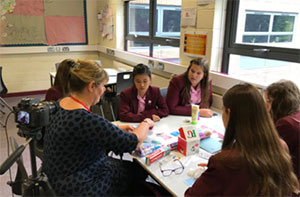Lanes for Drains are empowering teenagers to lead the fight against hidden plastics by working with secondary schools to produce unique and engaging lesson plans and a set of educational resources that are now available to schools nationwide.
The company – the largest privately owned drainage contractor in the UK – aims to raise awareness of the dangers of hidden plastics and how this generation can have the biggest impact in halting the problem.
Eight million tonnes of plastic is dumped in the ocean each year, causing pollution on a mass scale. Television programmes like Blue Planet II, which more than 14 million people tuned in to the first episode of, have sparked global debate about plastic pollution, helping to raise awareness of the issue - but not enough people know about the growing problem of hidden plastics.
There is hidden plastic in lots of everyday items that people do not dispose of correctly, often flushing them down the toilet and causing significant damage to our drains, sewers and oceans. Some of the main offenders include wet wipes, tampons, sanitary towels, condoms contact lenses and nappies, all of which contain hidden plastics to make them more durable - but that also makes them not biodegradable.
Lanes recently conducted a study in which the UK public admitted to wrongly flushing products containing plastics, despite knowing they should be disposed of in the bin. Lanes for Drains found that:
• As many as 20 million women have flushed a tampon or sanitary towel – full of hidden plastic – down the toilet in their lifetime
• Nearly a third (31%) of people have flushed a wet wipe down the toilet
• 10% of men have flushed a condom down the toilet in the last year.
In response to this, Lanes is on a mission to educate school children about topical environmental issues such as these.
Lanes has developed a comprehensive, downloadable lesson plan and supporting educational resources that enables secondary teachers to educate pupils about the dangers of hidden plastics, how to correctly dispose of them, and the positive changes they can make to reduce their environmental footprint.
Michelle Ringland, Head of Marketing at Lanes Group (pictured), said: “Although our study found that the majority of people know how to correctly dispose of wet wipes, tampons, sanitary towels, condoms and nappies, they continue to wrongly flush them down toilets. When flushed, these items cause significant damage to our drains and sewers, as well as
to the wider environment and marine life when they make their way to our oceans.
“The environment is under more pressure than ever, having been damaged by the actions of older generations, but it is the young and future generations who will have the biggest positive effect on solving the problem - so we want to instil positive habits in school children and empower them to drive environmental change at school and home.
“We’ve already seen how public opinion can drive positive change, such as with the 5p carrier bag charge and the ban on microbeads, and we want to encourage additional changes to further minimise the impact of plastic pollution.”
Tiph Moore, Teacher at Woodhey High School, said: “Global issues such as hidden plastics are largely underrepresented within the national curriculum, compared with the scale of the problem, but putting the spotlight on the topic through this lessons proved incredibly successful in engaging the children in my class. Lanes’ plan and resources provided me with everything I needed to deliver an effective and exciting eco-focused lesson and the kids were incredibly eager to learn, as well as share suggestions on how we can address these problems.”
This follows Lanes’ work developing and delivering lessons for primary school children, teaching them about the correct disposal of fat, oil and grease (FOG) to prevent fatbergs - congealed lumps of FOG, wet wipes, condoms, tampons and sanitary towels - from forming in our drains and sewers.
See lanesfordrains.co.uk for more.

Add new comment